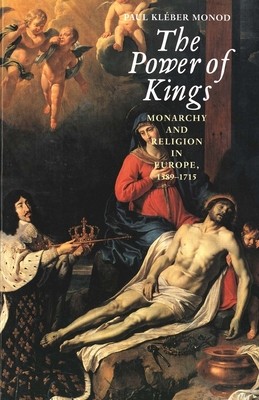
- We will send in 10–14 business days.
- Author: Paul Kleber Monod
- Publisher: Yale University Press
- ISBN-10: 0300090668
- ISBN-13: 9780300090666
- Format: 16 x 23.5 x 2.3 cm, softcover
- Language: English
- SAVE -10% with code: EXTRA
Reviews
Description
In the sixteenth century, the kings of Europe were like gods to their subjects. Within 150 years, however, this view of monarchs had altered dramatically: a king was the human, visible sign of the rational state. How did such a momentous shift in political understanding come about? This sweeping book explores the changing cultural significance of the power of European kings from the assassination of France's Henry III to the death of Louis XIV. Paul Kléber Monod draws on political history, political philosophy, anthropology, sociology, and literature to understand the relationship between kings and their political subjects and the interplay between monarchy and religion. He also makes use of 35 paintings and statues to illuminate the changing public images of kings. Discussing monarchies throughout Europe, from Britain to Russia, Monod tells how sixteenth-century kings and queens were thought to heal the sick with a touch, were mediators between divine authority and the Christian self in quasi-religious ceremonies, and were seen as ideal mirrors of human identity. By 1715, the sacred authority of the monarchy had been supplanted by an ideology fusing internal moral responsibility with external obedience to an abstract political authority. Subjects were expected to identify not with a sacred king but with the natural person of the ruler. No longer divine, the kings and queens of the Enlightenment took up a new, more human place in the hearts and minds of their subjects.
EXTRA 10 % discount with code: EXTRA
The promotion ends in 6d.01:08:19
The discount code is valid when purchasing from 10 €. Discounts do not stack.
- Author: Paul Kleber Monod
- Publisher: Yale University Press
- ISBN-10: 0300090668
- ISBN-13: 9780300090666
- Format: 16 x 23.5 x 2.3 cm, softcover
- Language: English English
In the sixteenth century, the kings of Europe were like gods to their subjects. Within 150 years, however, this view of monarchs had altered dramatically: a king was the human, visible sign of the rational state. How did such a momentous shift in political understanding come about? This sweeping book explores the changing cultural significance of the power of European kings from the assassination of France's Henry III to the death of Louis XIV. Paul Kléber Monod draws on political history, political philosophy, anthropology, sociology, and literature to understand the relationship between kings and their political subjects and the interplay between monarchy and religion. He also makes use of 35 paintings and statues to illuminate the changing public images of kings. Discussing monarchies throughout Europe, from Britain to Russia, Monod tells how sixteenth-century kings and queens were thought to heal the sick with a touch, were mediators between divine authority and the Christian self in quasi-religious ceremonies, and were seen as ideal mirrors of human identity. By 1715, the sacred authority of the monarchy had been supplanted by an ideology fusing internal moral responsibility with external obedience to an abstract political authority. Subjects were expected to identify not with a sacred king but with the natural person of the ruler. No longer divine, the kings and queens of the Enlightenment took up a new, more human place in the hearts and minds of their subjects.


Reviews